

Les prix Nobel français. William D. Phillips. I was born on 5 November 1948 in Wilkes-Barre, Pennsylvania, just across the river from the town of Kingston, where my parents lived with my one and a half year old sister, Maxine.
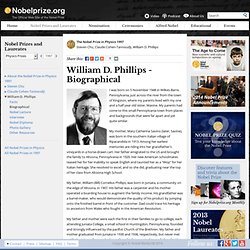
My parents had come to this small Pennsylvania town from places and backgrounds that were far apart and yet quite similar. My mother, Mary Catherine Savino (later, Savine), was born in the southern Italian village of Ripacandida in 1913. Among her earliest memories are riding into her grandfather's vineyards in a horse-drawn cart. Her father emigrated to the US and brought the family to Altoona, Pennsylvania in 1920. Her new American schoolmates teased her for her inability to speak English and taunted her as a "Wop" for her Italian heritage. Facts on the Nobel Prizes in Physics. Le Nobel de physique décerné à Perlmutter, Schmidt et Riess. Nobelists.net. Les prix Nobel français. List of Ig Nobel Prize winners. Prix Nobel : Toute l'actualité sur Le Monde.fr. Prix Nobel de physique 2012 à Serge Haroche, David J Wineland et au chat de Schrödinger. La remise du prix Nobel de physique 2012 à Serge Haroche et David J.
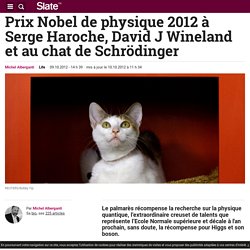
Wineland est une demi-surprise. Et une excellente nouvelle pour la recherche française. En attendant Peter Higgs et son boson, désormais grands favoris pour 2013, c’est la mécanique quantique et le chat de Schrödinger qui sont à l’honneur. En effet, les travaux de Serge Haroche concernent les phénomènes extraordinaires qui existent dans le monde quantique mais disparaissent dans le monde réel. A l’échelle de particules élémentaires comme les photons ou les atomes pris individuellement ou en très petits groupes, il est possible de superposer deux états contradictoires.
Le fameux chat de Schrödinger est alors à la fois mort et vivant. Par chance pour l’intelligibilité de l’univers dans lequel nous vivons, la matière ne persiste pas dans cette indécision. Nobelprize.org. List of Jewish Nobel laureates. Les prix Nobel et les juifs, avec détours par les mathématiques et les échecs. Entretiens, Genre, Politique, Judith Butler, Désir, Sexe. Y-Origins.com - Science and the Origin of Life. Fred Hoyle (British astrophysicist) “A common sense interpretation of the facts suggests that a superintellect has monkeyed with physics, as well as with chemistry and biology, and that there are no blind forces worth speaking about in nature.
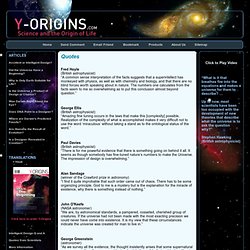
The numbers one calculates from the facts seem to me so overwhelming as to put this conclusion almost beyond question.” George Ellis (British astrophysicist) “Amazing fine tuning occurs in the laws that make this [complexity] possible. Realization of the complexity of what is accomplished makes it very difficult not to use the word ‘miraculous’ without taking a stand as to the ontological status of the word.” Paul Davies (British astrophysicist) “There is for me powerful evidence that there is something going on behind it all. It seems as though somebody has fine-tuned nature’s numbers to make the Universe. David J. Gross – Interviews. David Gross Answers Questions on the NobelPrize YouTube Channel The third in a series of Q&A sessions with Nobel Laureates on YouTube features David Gross, who received the Nobel Prize in Physics 2004 for discovering the workings of one of the four basic forces in nature, the strong force that holds atomic nuclei together.
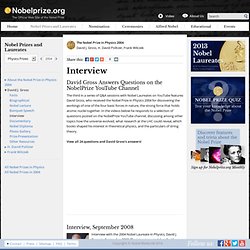
In the videos below he responds to a selection of questions posted on the NobelPrize YouTube channel, discussing among other topics how the universe evolved, what research at the LHC could reveal, which books shaped his interest in theoretical physics, and the particulars of string theory. View all 24 questions and David Gross's answers! Interview, September 2008 Interview with the 2004 Nobel Laureate in Physics, David J. See a Video of the Interview. 50 Nobel Laureates and Other Great Scientists Who Believe in God. Jewish Nobel Prize Winners. JEWISH NOBEL PRIZE WINNERS JINFO.ORG At least 194 Jews and people of half- or three-quarters-Jewish ancestry have been awarded the Nobel Prize,1 accounting for 22% of all individual recipients worldwide between 1901 and 2015, and constituting 36% of all US recipients2 during the same period.3 In the scientific research fields of Chemistry, Economics, Physics, and Physiology/Medicine, the corresponding world and US percentages are 26% and 38%, respectively.
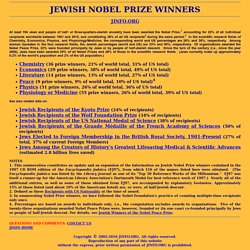
WHICH NOBEL PRIZE WINNERS BELIEVED IN GOD? NOBELISTS WHO BELIEVED IN GOD. The book, 50 NOBEL LAUREATES AND OTHER GREAT SCIENTISTS WHO BELIEVE IN GOD, comprises religious quotations from the most influential scientists and writers in the world.
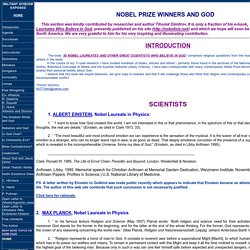
In the course of my 11-year research I have studied hundreds of books, articles and letters - primarily those found in the archives of the National Library of Bulgaria (Sofia), Biblioteca Comunale di Milano and the Austrian National Library (Vienna). I have also corresponded with many contemporary Nobel Prize-winning scientists who have shared their personal beliefs about God.
I believe that this book will inspire believers, will give hope to seekers and that it will challenge those who think that religion and contemporary science are in insurmountable conflict. Tihomir Dimitrov, tih777dim@yahoo.com 1. 1. ¨ “I want to know how God created this world. 2. ¨ “The most beautiful and most profound emotion we can experience is the sensation of the mystical. Clark, Ronald W. 1985.